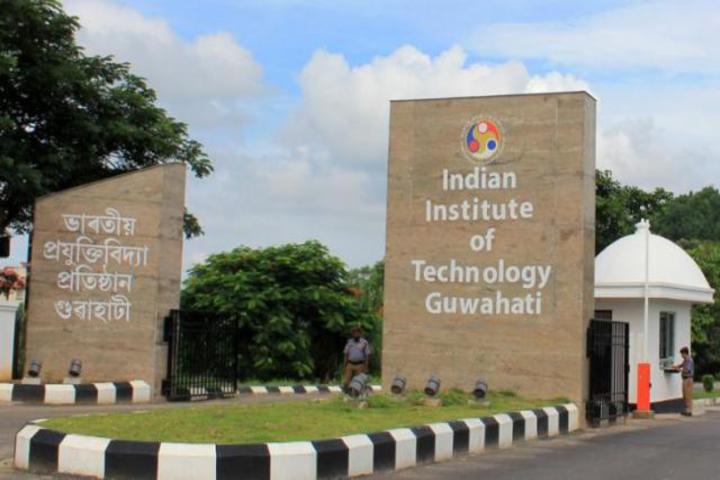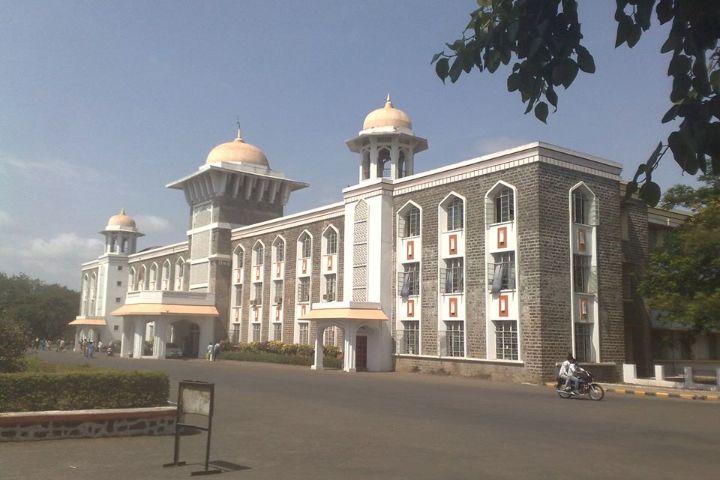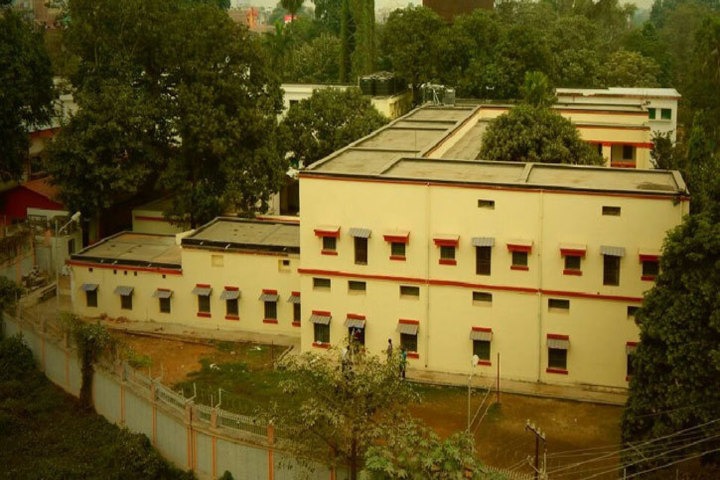
Chemical Science and Technology Course Details - Fees, Subjects, Syllabus, Duration, Eligibility, Career Scope
Degrees offered: Ph.D, B.Sc., M.Sc., B.A.(Hons), BS
What is Chemical Science and Technology
Chemical science and technology is an integrative subject that forms the core of chemical engineering. It blends the concepts of electronic materials, plant designing, applied chemical kinetics, thermodynamics, biochemical engineering and so on. Students pursuing chemical science and technology courses not only gain knowledge in various processes of the industrial production of chemical substances but also become trained in them. Qualified chemical technologists usually get to work with chemists, analyzing various compounds and tracking data using advanced data analysis tools and technologies. Globally, the demand for chemical science and technology graduates and postgraduates is high. There is also a huge scope in research and development space. With the advancement in new materials and brewing energy crisis, this scope is expected to widen further. Excellent career opportunities ensuring increasingly higher earnings and multi-industry exposure make chemical science and technology a much desirable course among students eyeing a seat in one of the reputable engineering/technology institutes of the country.
Chemical Science and Technology- Degrees and Levels:
Diploma level (3 years course): Students can opt for Chemical Science and Technology diploma courses after passing class 10. There are a number of related streams to choose from. These are:
Diploma in chemical technology
Diploma in applied science (chemical technology)
Diploma in polymer science and technology
Diploma in plastics technology
Diploma in plastics mould technology
Diploma in polymer technology
Undergraduate level (4-year course): As for the bachelor’s degree, students can choose from a number of options within the field of chemical science and technology. These are:
B. Tech in chemical science and technology
B. Tech in chemical technology
B. Tech in chemical science and engineering
B. Tech in chemical and process engineering
B.S in chemical technology
B.E. or B.Tech in polymer technology
B. Tech or B.E. in polymer science and chemical technology
Postgraduate level (2-year courses): After completing B. Tech, aspirants can do masters in chemical science and technology or any of the following related subjects:
M. Tech or M.E. chemical science and technology
M. Tech or M.E. in polymer science and technology
M. Tech or M.E. chemical technology
M. Tech or M.E. in plastic technology
M. Tech or M.E. chemical and process engineering
M. Tech or M.E. in polymer science and chemical technology
Doctoral program (research-based)- PhD in chemical science and technology can be done after completing post-graduation and then qualifying the required entrance examinations.
Chemical Science and Technology- Minimum and Maximum
A diploma is pursued immediately after class 10 and is of a minimum of 36 months’ duration. When pursued after class 12, it has a duration of 24 months. A chemical science and technology undergraduate course requires at least 48 months to complete. M. Tech in chemical science and technology/chemical science and engineering/chemical technology/applied sciences (chemical technology) is completed in 24 months. It usually follows a semester system i.e. a total of four semesters is covered in the entire M.Tech programme. This includes certain time durations set aside for project work and research. The combined degree or the dual degree course is usually 60 months duration. These are the minimum duration of the chemical science and technology courses. The maximum duration depends largely on the policies of the individual institutes.
Eligibility Criteria (UG & PG) of Chemical Science and Technology
Diploma level: Candidates who have completed their class 10+2 examinations with at least 45% marks in science and mathematics separately are eligible for this course. For SC/ST/PwD category candidates, the required percentage of marks is lower.
Undergraduate level: The minimum criterion of eligibility needed to be met for admission to the course is a 10+2 qualification in the science stream. Additionally, candidates are needed to qualify any of the relevant JEE exam/ institute level entrance exam for admission to the course. Lateral entry in the second year is also accepted in the second year for candidates that have completed a diploma degree in chemical science and technology.
Postgraduate level: Aspirants must score 60% aggregate marks or earn a 6.0 GPA in graduation examination to be eligible for enrolling in the postgraduate level course. They must complete their graduation from an institution approved by UGC or AICTE or universities approved by the parliamentary act.
Doctoral programme (research-based): Candidates willing to apply for doctoral programmes need to fulfil the following minimum eligibility criteria:
Post-graduation (M. Sc/ M. Tech) in chemical science and technology or related stream from a recognized university
Minimum 55% marks in aggregate at PG level
Admission Criteria for Chemical Science and Technology Courses after Class 12
For admission to diploma level, the student must have read English as a compulsory subject till class 10. For admission into bachelor’s degree, students must pass lass 10+2 from a recognised educational board with science subject combination. As for marks, the admission criteria is to secure 60% marks minimum both in class 10 and class 10+2 qualifying examinations. However, the percentage is lower for reserved category students. Completing B. Tech or B.E degree is mandatory for admission into a postgraduate course. For some institutes like the Indian Institute of Technology, students have to possess a valid GATE score too in chemical technology/chemical engineering/chemical science/polymer science and engineering/polymer technology. Only those who have obtained their B. Tech from an IIT with a CGPA of more than 8.0/10 can be awarded some relaxation. Some institutes also conduct entrance tests for admission to a postgraduate course; a candidate must pass the test to secure a seat in that institute.
Entrance Examinations for Chemical Science and Technology Courses
Admissions for a diploma can be availed directly by approaching the institutes’ administrative office. Candidates need to submit the filled-in application form and other required documents directly to the institute. The candidates can be offered admission based on their merit or on a first-come-first-serve basis according to the institutional policies. The criterion for a diploma is a pass in class 10 or 10+2 or its equivalent examination with 55% in each of the subjects of science and mathematics. For bachelor degree, passing the Joint Entrance Examination or JEE is a must. A candidate must have cleared JEE Main for the entrance or any specific test conducted by a particular university such as VITEEE conducted by Vellore Institute of Technology. After entrance tests, institutes hold group discussion and personal interview sessions mandatory for each candidate who qualified for the exam. The entrance exam for post-graduation courses is Graduate Aptitude Test in Engineering or GATE in various subjects such as chemical sciences, chemical technology and chemical engineering. The GATE score allows admission to leading institutes like the IITs.
Chemical Science and Technology- Fees and Expenses
The tuition fee and college expenses for popular chemical science and technology courses are as follows:
Diploma level: The total fee is in the range of Rs.6, 000 to Rs.1, 00,000. As of now, there are three to four government polytechnic colleges for diploma in chemical technology.
Undergraduate level: The total fee entirely depends on the college whether it is a public or private one and it varies a lot. It is typically between Rs.4, 00,000 and Rs.6, 00,000 for the 4-year programme.
Postgraduate and research: The fee is in the range of Rs.50, 000 to Rs 1, 50,000 for the entire duration of 2 years. There is a decent stipend allocated for MS and PhD students of chemical science and technology. In some public colleges, the GATE qualified postgraduate students are eligible for a stipend of approximately Rs.12, 000 per month. It can be anywhere between Rs.12, 000 and Rs.45, 000 per month.
College Predictors VIEW ALL
Scope of Chemical Science and Technology in India and Abroad
In India, the recent trend shows that the core sector industries namely coal, natural gas, crude oil, power, steel, fertilisers, refinery products, and cement are evolving and slated for phenomenal growth in the next five to ten years driven by rapid urbanisation. As a result, there will be a surge in demand for chemical scientists and technologists.
Chemical science and technology graduates are highly sought after by international companies. As a chemical technologist, one can work in manufacturing units/production plants of varied pharmaceutical, speciality chemicals, petrochemicals, steel, food processing, polymers, biochemical drugs and energy sectors. For students aiming to join research, chemical science and technology as a field has endless opportunities overseas with an increased need for sustainability of resources and energy crisis. Advanced drugs delivery applications, chemically transformed approach towards sustainability and coming of age of nano biochemistry have made chemical science and technology one of the most coveted career options for graduates within the country and across the globe. As already mentioned, multinational companies like BASF SE, Dow, Evonik Industries, DuPont, Air Liquide, and Mitsubishi Chemical Holdings open several positions for qualified chemical scientists and technologists every year. One has to keep his eyes and ear open to grab the right opportunity at the right time. Then there will be no looking back.
Course Fees Chemical Science and Technology
| Minimum Fees | Maximum Fees | |||
|---|---|---|---|---|
| Private | Government | Private | Government | |
| UG | ||||
| PG | ||||
| DOCTORAL | ||||
| DIPLOMA | ||||
Course Subjects
The list of the major course subjects for both undergraduate and postgraduate chemical science and technology programmes semester-wise is as follows:
Semester I
Electrical sciences
Mathematics–I
Workshop/physics laboratory
Chemistry laboratory
Physical training-I
Engineering drawing
Physics-I
Semester II
Physical training II
Basic electronics laboratory
Introduction to computing
Physics-II
Mathematics-II
Computing laboratory
Modern biology
Engineering mechanics
Physics laboratory/workshop
Semester III
Mathematics III
Chemical process calculations
Fluid mechanics
Introduction to quantum chemistry
HSS elective – I
Organic chemistry
NCC/NSO/COS
Semester IV
Chemical technology Lab –I
Inorganic chemistry
Computational chemistry
HSS elective – II
Spectroscopic techniques in chemistry
NCC/NSO/COS
Applied organic chemistry
Semester V
Environmental chemistry
Chemical kinetics and electrochemistry
HSS elective–III
Computational physics
Chemical technology lab–II
Industrial chemistry
Environmental chemistry
Chemical kinetics and electrochemistry
Industrial chemistry
Semester VI
Heat and mass transfer
Introduction to chemical thermodynamics and equilibrium
Petroleum and petrochemicals
Polymer chemistry
Chemical technology lab–III
Open elective–I
Heat and mass transfer
Introduction to chemical thermodynamics and equilibrium
Petroleum and petrochemicals
Semester VII
Dept. elective-I
Technical report and presentation
Dept. elective-II
Modern chemical technology
Open elective–II
Modern chemical technology
Project–I
Technical report and presentation
Semester VIII
Dept. elective-III
HSS elective-IV
Dept. elective-IV
Project–II
Open elective-III
This is only a representative list of subjects and is certainly not an exhaustive one. The exact course title and list of subjects may vary from college to college.
Careers in Chemical Science and Technology
After obtaining a degree in chemical science and technology, one can get jobs as a chemical technologist, chemical engineer, product/process development scientist, colour technologist, petroleum engineer etc. Besides, a degree in Chemical Science and Technology course can also open up opportunities in the chemical analysis and data evaluation, material engineering, energy management, mining engineering and other top-notch yet somewhat unique fields. Read on to know more about the job profiles that one can avail of after course completion, in detail.
Upcoming trends
In the world of chemical science and technology, there is an endless scope of evolution. Thanks to the advancements in nanotechnology, implants are going to be the next big thing in medical science. Nanodentistry using nanomaterials, biotechnology and nanorobotics will ensure better oral health. Keeping a check on the ozone activity is another important challenge that chemical technologists have taken up. This has led to the discovery of some new variety of refrigerants that cause minimum harm to the environment. Chemical scientists also ensure that food products are well-preserved and safe.
Job Profiles and Top Recruiters
Some of the top job profiles that one can aspire to apply after completing a course in Chemical Science and Technology are:
Biotechnologist: As a biotechnologist one is involved in creating products and improving them to suit the need of people. They modify and improve agricultural processes, products of medicine and other conservational methods by the application of biological organisms.
Chemical engineer: They are mainly involved in developing and designing various processes of chemical manufacturing. They implement the principles of math, biology, physics and chemistry to the production of chemicals, drugs, fuels, foods etc.
Product/process development scientist: They develop new products and services understanding the recent trends, public demands and analysing the feedbacks. They utilise the materials, technologies and procedures and perform research project management.
Colour technologist: They are responsible for developing pigments, dyes and colours. They possess excellent organisational skills. The job responsibilities are different depending upon the industry they choose to work in.
Petroleum engineer: These engineers see to it that safe extraction of natural oil and gas from their deposits under the earth’s crust takes place. They plan the construction and choose the location of boreholes and oil wells through which the resources are extracted.
Analytical chemist: They are involved in analysing and assessing the nature and chemical structure of various substances. They are integral in toxicology, forensic analysis, development of drugs etc. Analytical chemists can also be a part of the pharmaceutical industry.
Materials engineer: These engineers develop and design materials and also create the technology to process those materials. They have to analyse materials and data that is collected of them, test the products or the raw materials, monitor the overall performance and ensure the quality of the finished item.
Energy manager: The energy efficiency of a particular plant is monitored by energy managers. The conservation measures are implemented by them and they also supervise energy consumption.
Mining engineer: These engineers are responsible for designing underground mines and open-pit mines. The mine shafts are also constructed under their supervision. Transporting minerals to processing units are also devised by them.
The major recruiters in this field, in India, are:
Hindustan Unilever
Reliance industries limited
Ranbaxy
Dr Reddy
Sun Pharma
P & G
GSFC/GSPL
Cairn India
Essar Oil
Chambal fertilizer
Aditya Birla
Jaypee group
Technip
Avery Davison
All PSUs -IOCL/HPCL/BPCL/IFFCO etc.
DRDO
TATA Chemicals
United phosphate limited
Saint Gobain
Oil and Natural Gas Corporation (ONGC)
Hindustan Petroleum Corporation Limited (HPCL)
Linde India
The quest in the hope of making life easier by implementing concepts such as induction, hydration and malleability will engage more skilled individuals in the field of chemical science and technology. Thus, with rising concerns of pollution control, public health issues, climate change and environmental conservation, chemical science and technology has evolved as one of the most sought after course to pursue.
Average Salary
If we look at the pay scale for chemical technologists, the salary is quite lucrative. Freshers can earn an average pay of Rs.25, 000 to Rs.30, 000 per month. With experience and specific skill sets one can earn an average of Rs.4-6 lakhs per year. Candidates having a postgraduate degree can expect salary within a range of Rs.6 - 12 lakhs. Though salaries vary in both the private and government sectors, there are high-end packages for those willing to work abroad. Some of the international companies like BASF SE, Dow, Evonik Industries, DuPont, Air Liquide, Mitsubishi Chemical Holdings offer a salary of Rs.1–6 lakhs per month for competent professionals in chemical science and technology.
Required Skillset for Chemical Science and Technology
Technical ability: With the advancement in technology everything is becoming more and more technology-oriented. Thus, the works of chemical scientists and technologists also involve in-depth technical ability.
High motivation: Without motivation, no work can be continued with efficacy. It is only with high levels of motivation that a person can achieve the organisational goals and his personal goals as a chemical scientist and technologist. This ensures increased productivity.
In-depth knowledge: Without a thorough knowledge of chemical science and technology, one can never be a successful chemical engineer. The subject is based on the fundamentals of physics, maths and chemistry. Hence, one needs to know the subject in and out with special emphasis on calculus, chemical biology, electronics, physical and organic chemistry, higher mathematics, and so on.
Communication skills: It is only through effective communication that the flow of information in an organisation or even a team can be ensured. Possessing strong verbal and non-verbal skills is important as that way one can ensure the completion of a project while working as a team.
Analytical skills: This is important as this particular skill will enable a chemical scientist and technologist to solve a problem as and when it arises. The analytical skill also helps one to assess what measures to take to overcome a problematic situation. Possessing this skill means understanding problems and analysing them in a way to find viable solutions to it.
Alertness: While any work related to technology demands a certain level of innovativeness, a person dealing with chemicals should be alert enough to judge where exactly a process or a solution may go wrong and accordingly, he should decide the next best step.
Course Curriculum for Chemical Science and Technology
The course curriculum for diploma and undergraduate programmes of chemical science and technology includes lessons from the following branches of science and technology- mostly introductory in nature. One can opt for any of these branches for specialisation at the postgraduate level: –
Introductory science courses
Basic engineering courses
Introductory mathematics and applied mathematics
Materials science and advanced materials chemistry
Introduction to chemical engineering
Polymer sciences
Introduction to other fields of electrical engineering
Chemical reaction engineering
Process Instrumentation dynamics and control
Chemical process plant safety
Environmental chemistry
Chemical biology
Organic chemistry, inorganic and practical chemistry
Computer programming and engineering graphics
Mechanical operations and heat and mass transfer
Chemical kinetics & electrochemistry
Chemical technology lab on inorganic materials- electro-inorganic synthesis, nanomaterial synthesis
Spectroscopic techniques in chemistry
Chemical technology lab on organic synthesis -identification of organic compounds - preparation & estimation - separation technique - characterization of compounds
Petroleum and petrochemicals
Chemical technology lab on analytical chemistry and instrumentation- kinetics and thermodynamics, physical properties like surface tension, CMC, EMF, microfluidics, surface and interfacial chemistry, and applied organic chemistry
Industrial chemistry
Introduction to transport phenomena
Computational chemistry & quantum simulations
Students also liked
- Online Degree and Diploma Courses
- Online Free Courses and Certifications
- Online Short Term Courses and Certifications
- Online Certification Courses
- View List of all Online Courses and Certifications
- Top Certification Course Providers
Popular Chemical Science and Technology Entrance Exams in India
JEE Advanced
Application Process: 07 Apr, 2025 - 02 May, 2025
IISER Aptitude Test
Exam Date: 25 May, 2025
CUET UG
Exam Date: 08 May, 2025 - 01 Jun, 2025
Frequently Asked Questions (FAQs)
Question: What are the other colleges offering B. Tech in CST?
Answer :
Other colleges and universities offering CST courses are:
Thapar University Patiala
Question: Which are the top colleges that offer chemical science and technology courses?
Answer :
The top institutes in India offering bachelor degree in chemical science and technology are:
Question: What is the difference in course fee between private and public colleges?
Answer :
On average, the fee for chemical science and technology courses in public colleges is Rs.8.55 lakhs whereas, that of private colleges is Rs.8.59 lakhs.
Question: Which colleges offer lateral entry in chemical science and technology course?
Answer :
Dr M. G. R. University, Tamil Nadu and Dr K. N. Modi University, Rajasthan offer lateral entry admission to chemical science and technology course. Students with a polytechnic diploma degree in this subject or other subjects of the same domain can apply for this. They must have scored minimum 50% marks in aggregate.
Question: What are the entrance exams for admission into the chemical science and technology courses?
Answer :
Joint Entrance Exam (JEE) Main and Vellore Institute of Technology Engineering Entrance Exam (VITEEE) are the two major entrance exams that one has to crack for getting admission in a college offering chemical science and technology course. Both of these examinations test the candidate’s knowledge of physics, mathematics and chemistry. Besides these two, WBJEE (West Bengal Joint Entrance Examination), TANCET (Tamil Nadu Common Entrance Test), BITSAT (Birla Institute of Technology and Science Admission Test) are also there for allowing admission in various undergraduate CST courses.




.JPG)
















